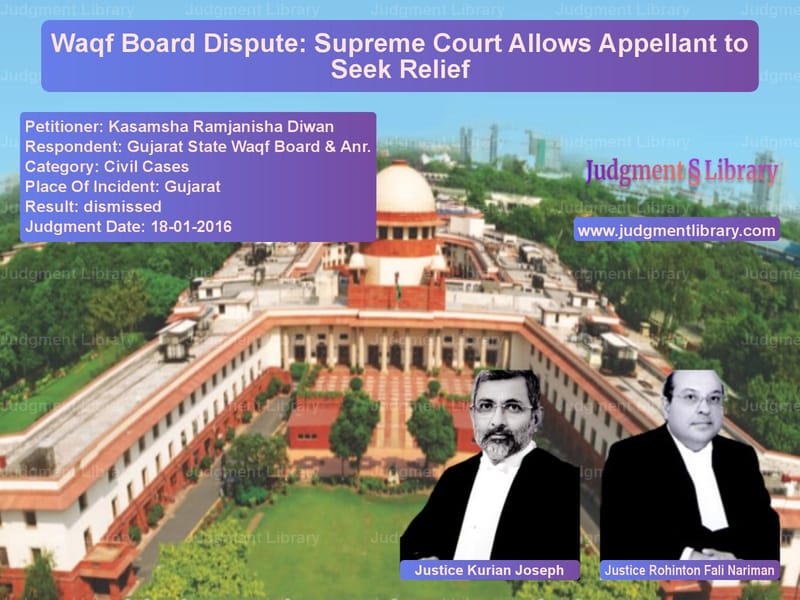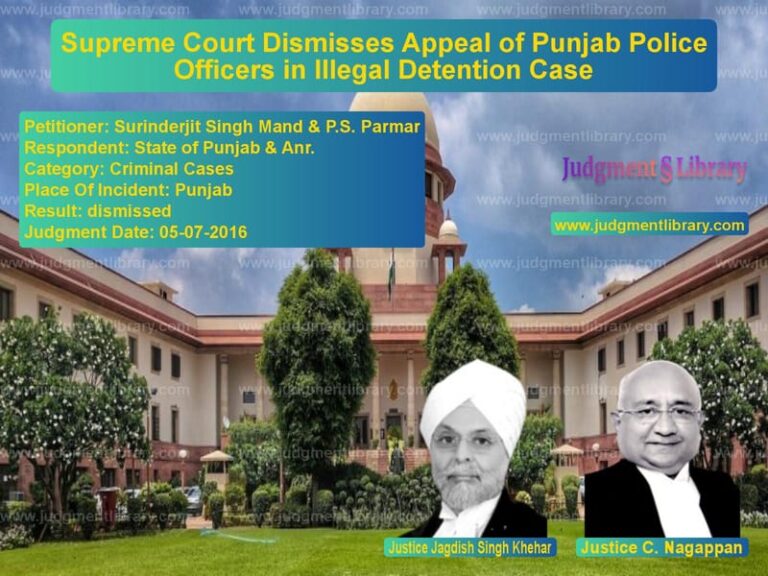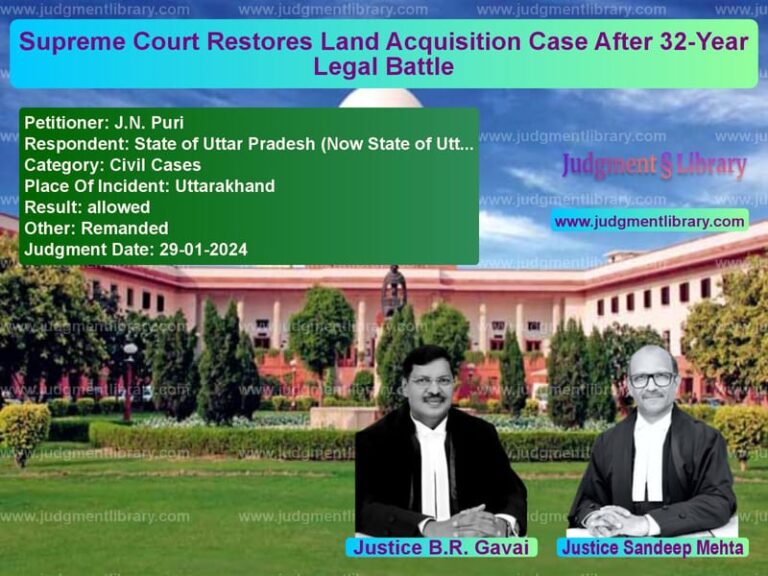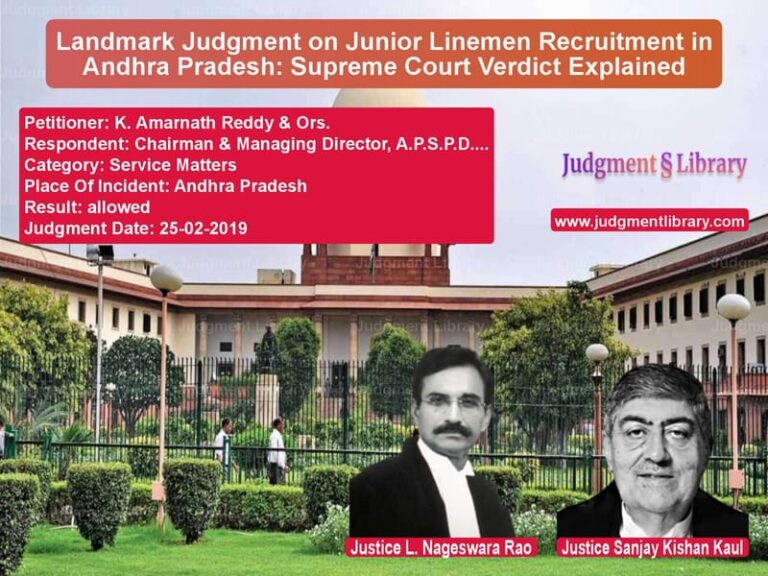Waqf Board Dispute: Supreme Court Allows Appellant to Seek Relief
The case of Kasamsha Ramjanisha Diwan v. Gujarat State Waqf Board & Anr. revolves around a long-standing dispute concerning the management of Bala Pir Trust. The Supreme Court disposed of the appeal by allowing the appellant to seek appropriate legal remedies before the appropriate forum.
Background of the Case
The dispute concerns the Bala Pir Trust in Gujarat. The appellant, Kasamsha Ramjanisha Diwan, challenged an order of the Gujarat State Waqf Board regarding the administration of the Trust. A learned Single Judge of the High Court initially held that the disputes should be adjudicated by a Civil Court. However, the same Judge later remanded the matter to the Gujarat State Waqf Board for resolution.
On appeal, the Division Bench of the Gujarat High Court modified the Single Judge’s order and vacated the remand, leaving the appellant without a clear remedy. Dissatisfied with the High Court’s decision, the appellant approached the Supreme Court.
Key Legal Issues
- Whether the Gujarat State Waqf Board had the authority to decide disputes concerning the Bala Pir Trust.
- Whether the High Court erred in vacating the order of remand.
- Whether the appellant should seek remedies before an alternate forum.
Arguments Presented
Appellant’s Arguments
- The appellant contended that the High Court’s Division Bench erred in modifying the Single Judge’s decision without providing a clear remedy.
- He argued that the disputes concerning the Trust should be adjudicated in a fair and lawful manner.
- The appellant sought directions to clarify the appropriate legal forum for resolving the matter.
Respondents’ Arguments
- The respondents, including the Gujarat State Waqf Board, maintained that the decision of the High Court was valid.
- They contended that the appellant could seek remedy under the Waqf Act or through a Civil Court, as appropriate.
- The respondents argued that no injustice had been caused to the appellant by the High Court’s decision.
Supreme Court’s Ruling
The Supreme Court granted the appellant the liberty to seek remedies before an appropriate forum and disposed of the appeal accordingly.
Clarification on Legal Remedy
- The Court clarified that the appellant had the right to approach a competent forum to resolve the dispute.
- “We permit the appellant to work out the remedy, as per the liberty granted to the appellant in the impugned judgment, before an appropriate forum and initiate the process within a period of one month.”
Interim Relief for Eight Weeks
- The Supreme Court extended the interim order passed by the High Court to remain in force for a period of eight weeks.
- “In the interest of both parties, we are of the view that the interim order shall continue for a period of eight weeks so as to enable the appellant to work out the remedies.”
Limited Scope of Judgment
- The Supreme Court explicitly stated that it had not expressed any opinion on the merits of the case.
- “We make it clear that we have not considered the rival contentions of the parties and we have not expressed any opinion on the merits of the case.”
- The Court left it open for the concerned forum to pass appropriate orders, including interim relief.
Legal Precedents Considered
The Supreme Court’s ruling aligns with past judgments emphasizing the right to seek legal remedies before the appropriate forum:
- Board of Muslim Wakfs, Rajasthan v. Radha Krishna (1979) 2 SCC 468 – Clarified the jurisdiction of Waqf Boards in property disputes.
- Syed Yakoob v. Radhakrishnan (1964) AIR 477 – Established the limits of judicial review in administrative decisions.
- Union of India v. Shiv Raj (2014) 6 SCC 564 – Reinforced the principle that parties should seek remedies under the appropriate legal framework.
Key Takeaways from the Judgment
- Right to Seek Legal Remedies: The ruling reaffirms that parties can approach the correct forum for dispute resolution.
- Interim Relief to Prevent Prejudice: The Court ensured that neither party faced immediate adverse consequences.
- No Determination on Merits: The Supreme Court focused on procedural fairness rather than making a substantive ruling on the case.
Impact of the Judgment
This ruling has significant implications for similar disputes involving Waqf properties:
- For Waqf Boards: Establishes that High Courts cannot summarily vacate orders without clarifying legal remedies.
- For Individuals and Trustees: Provides guidance on seeking legal recourse in Waqf disputes.
- For the Judiciary: Reinforces the importance of allowing parties to exercise their legal rights.
Conclusion
The case of Kasamsha Ramjanisha Diwan v. Gujarat State Waqf Board & Anr. highlights the need for clarity in legal proceedings involving Waqf properties. By allowing the appellant to seek appropriate remedies, the Supreme Court ensured procedural fairness while upholding the principles of justice.
Don’t miss out on the full details! Download the complete judgment in PDF format below and gain valuable insights instantly!
Download Judgment: Kasamsha Ramjanisha vs Gujarat State Waqf B Supreme Court of India Judgment Dated 18-01-2016.pdf
Direct Downlaod Judgment: Direct downlaod this Judgment
See all petitions in Property Disputes
See all petitions in Contract Disputes
See all petitions in Succession and Wills
See all petitions in Judgment by Kurian Joseph
See all petitions in dismissed
See all petitions in supreme court of India judgments January 2016
See all petitions in 2016 judgments
See all posts in Civil Cases Category
See all allowed petitions in Civil Cases Category
See all Dismissed petitions in Civil Cases Category
See all partially allowed petitions in Civil Cases Category







